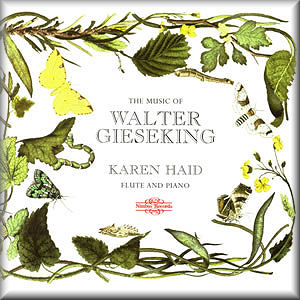 |
 |
| 
Buy
through MusicWeb
for £12 postage paid World-wide.
Musicweb
Purchase button
Sound Samples and Downloads
|
Walter GIESEKING
(1895-1956)
Variations on a Theme by Edvard Grieg, for flute and piano
[22:12]
Selected Songs by Richard Strauss, for solo piano [15:55]
Spiel um ein Kinderlied, for piano four hands [8:12]
Sonatine, for flute and piano [14:30]
Three Dance Improvisations, for piano [7:47]
 Karen Haid (piano, piano II, flute)
Karen Haid (piano, piano II, flute)
rec. Recital Hall, Purchase College, SUNY, 11-13 January and 1-2
March 2000. DDD
 NIMBUS NI 5696 [68:36]
NIMBUS NI 5696 [68:36] 
|
|
|
To say that the great Debussy pianist Walter Gieseking is little
known as a composer is an understatement - his entry in the
New Grove does not even mention his works. In that regard, Karen
Haid's comment in her ample, informative notes, that "each
piece [...is] greatly cherished by performers and audiences
upon discovery" is wide of the mark. She also describes
the works in her unique recital as "musical treasure[s]",
which most listeners will probably find an exaggeration, although
they are certainly very easy on the ear, and not without many
radiant passages.
Gieseking's music is stylistically impressionistic and pastoral
- hardly surprising, given that his musical heroes were Debussy
and Ravel and the fact that he inherited his father's love of
the natural world. Often the influence of jazz shows through
too, in the piano and flute writing alike, in all probability
filtered again through Debussy and Ravel. The Three Dance
Improvisations are more like something Gershwin or Grainger
might have extemporised for party guests.
Gieseking can be forgiven for not showing any special insight
into flute composition - he is self-taught, for one thing -
but his piano writing too is surprisingly conventional, though
never without interest. There is much here to tap fingers to
and perhaps hum along with, not least the Spiel um ein Kinderlied
('Play on a Children's Song'), the song in question being
Twinkle, Twinkle, Little Star. The Flute Sonatina
is probably the pick of the bunch: melodious, elegant, harmonically
unconventional, reminiscent now of Poulenc.
For a soloist, Haid's programme is out of the ordinary, to say
the least: two works for solo piano, one for four hands, and
two more for flute and piano - with all parts played by Haid!
The recording is obviously a digital contrivance of sorts: 'mixing'
is not a term that endears a CD of art music to prospective
buyers, but aside from that, it is difficult not to admire Haid's
genial performances. She trained first as a pianist, but her
CV in both instrumental areas is impressive, even if this is
her first, and to date last, commercial recording. Previously
US-based, Haid is now apparently working as a teacher of ESL
and Italian in Italy, as well as reviewing concerts there and
occasionally performing with flute or piano.
Musically speaking, this disc, originally released in 2001 and
again in 2006, is more attractive than compelling, but as a
curiosity in more ways than one - Haid's multiple performances
and the fact that this is the only CD of Gieseking as a composer
- it is worth anyone's consideration.
Sound quality is very good, although many will find the flute
too far forward relative to the piano, and therefore tending
at times towards stridency of tone. On its own the piano too
is closely miked, giving a cosy fireside effect.
Byzantion
Collected reviews and contact at reviews.gramma.co.uk
|
|












